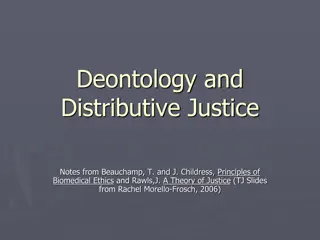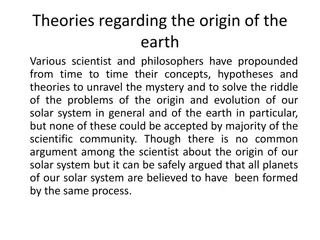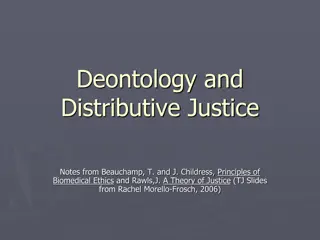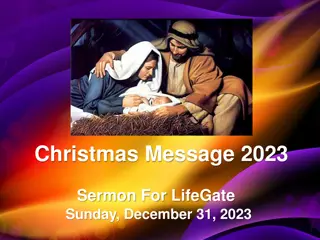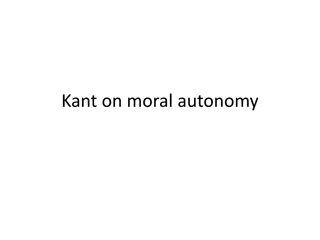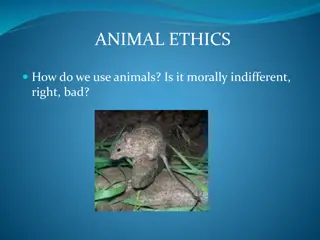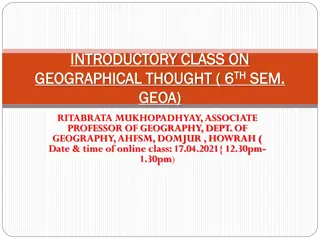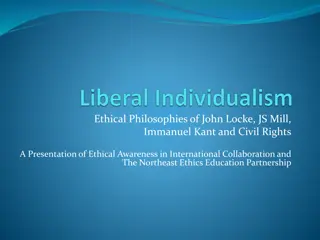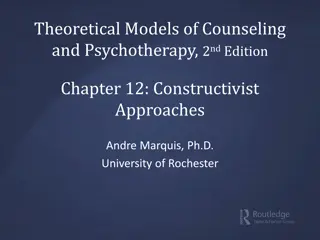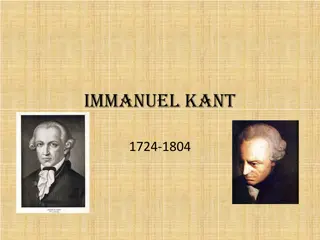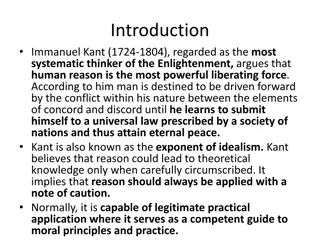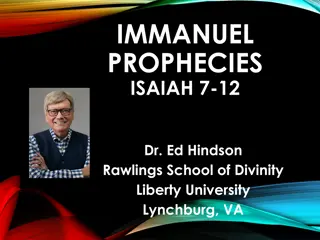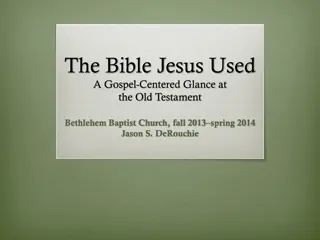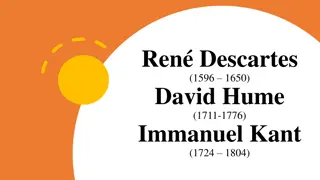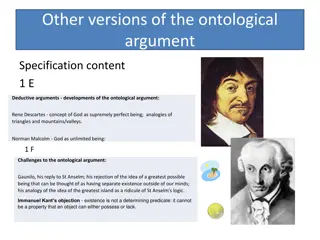Understanding Deontology and Distributive Justice in Ethics
Deontology, originating from the Greek words for duty and study of, focuses on morally required, forbidden, or permitted choices. It emphasizes obedience to duty and opposes utilitarianism, prioritizing what is morally right over the overall good. Unlike virtue theories, deontology assesses moral ob
2 views • 32 slides
Theories on the Origin of Earth and Solar System
Scientists and philosophers have proposed various theories regarding the origin of Earth and our solar system, with concepts ranging from evolutionary to catastrophic. The Dust gas cloud theory, Planetesimal hypothesis, Binary star hypothesis, and more have been suggested to explain how planets were
4 views • 7 slides
Deontology and Distributive Justice in Ethics
Deontology, rooted in the concept of duty, focuses on morally required, forbidden, or permitted choices. It emphasizes obedience to duty, opposing utilitarian claims. Unlike virtue theories, deontology prioritizes what is right over an overall conception of good. Immanuel Kant's categorical imperati
0 views • 32 slides
Reflecting on the Prophecies Fulfilled by Jesus in His Birth
Delve into the profound prophecies of Jesus' birth fulfilled with precision, emphasizing the divine timing and order orchestrated by God. Explore the significance of biblical passages foretelling the arrival of Immanuel, the Prince of Peace, and how the Magi discerned the exact date through historic
0 views • 14 slides
Kant on Moral Autonomy: Insights on Duty and Inclination
Immanuel Kant emphasizes the significance of moral freedom and autonomy, highlighting the superiority of acting out of duty over mere inclination. He asserts that a good will is inherently valuable, irrespective of consequences or external motivations. Kant distinguishes between actions driven by du
0 views • 21 slides
Understanding Animal Ethics: Perspectives and Philosophies
Exploring the complexities of animal ethics, this content delves into various viewpoints on how we should treat animals, ranging from Stoic and Christian ethics to Immanuel Kant's moral autonomy and utilitarianism. Discussions on moral considerations, duties towards animals, and the importance of co
0 views • 37 slides
Introduction to Geographical Thought: Key Concepts and Major Schools
Geographical thought explores the description and interpretation of Earth's phenomena, addressing fundamental questions of geography. It involves concepts such as Earth surface, spatial distribution, areal differentiation, and more. It also delves into the relations with other sciences and social sc
0 views • 21 slides
Ethical Philosophies of John Locke, JS Mill, Immanuel Kant, and Civil Rights
This presentation explores the ethical philosophies of John Locke, JS Mill, and Immanuel Kant, focusing on individual rights, moral autonomy, and the principles of classical liberalism. It discusses the influence of these philosophers on research ethics, emphasizing the protection of individual huma
0 views • 48 slides
Constructivist Approaches in Counseling and Psychotherapy: A Philosophical Perspective
Constructivist approaches in counseling and psychotherapy emphasize the ongoing process of structuring experiences to create meaning. This perspective involves philosophical underpinnings from thinkers such as the Buddha, Immanuel Kant, and Jean Piaget, highlighting the role of individual constructi
0 views • 35 slides
Exploring the Philosophy of Immanuel Kant
Delve into the profound philosophical works of Immanuel Kant, focusing on Kantian epistemology, the nature of judgments, synthetic a priori judgments, enlightenment, morality through the Categorical Imperative, and political theories advocating for perpetual peace. Kant's ideas challenge traditional
0 views • 8 slides
Kant's Moral Philosophy: Reason, Freedom, and the State
Immanuel Kant, a prominent Enlightenment thinker, emphasizes the liberating power of human reason in guiding individuals towards moral principles and practices. Kant's moral philosophy centers on treating each person as an end-in-itself, driven by the good will informed by reason. His concept of mor
0 views • 14 slides
Understanding Messianic Interpretations in the Old Testament
The discussion revolves around the rejection of defining the Old Testament as solely messianic and how the early Church ascribed such texts to Jesus based on their conviction rather than explicit Old Testament support. The evolving evangelical perspective towards the Hebrew Bible's messianic nature
0 views • 34 slides
Insights into the Gospel-Centered Glance at the Old Testament
Explore the profound connections between the Old Testament prophecies and the fulfillment in the Gospels, particularly focusing on Isaiah’s prophecies, Matthew’s Messianic hope, John's announcement, and Jesus' ministry. Through a concise overview of key passages like the judgment of the vineyard
0 views • 9 slides
A Dive into Philosophical Thought: Descartes, Hume, Kant, and More
Explore the intellectual landscape of renowned philosophers like René Descartes, David Hume, Immanuel Kant, and other influential figures such as Nicolaus Copernicus and Martin Luther. Delve into Descartes' meditations on doubt, the nature of the human mind, and the example of wax, reflecting on fo
0 views • 34 slides
Exploring Various Versions of the Ontological Argument
This content delves into different versions of the ontological argument, including developments by philosophers like Rene Descartes and challenges posed by Gaunilo and Immanuel Kant. An exploration of the concept of God as a supremely perfect being is presented, along with key arguments and objectio
0 views • 27 slides
